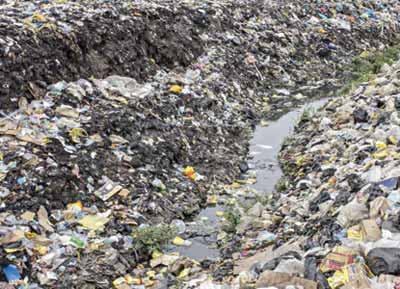


Oyo, Communities In Talks Over New Solid Waste Disposal Plan
in Properties

POISED to have a sustainable environment among others in the city of Ibadan, the government and communities have held a parley to iron out grey areas’ in the operations of the Oyo State Solid Waste Management Authority (OYOWMA).
Ibadan is the capital of Oyo State and the third largest city in Nigeria. According to the United Nations 2014, estimate of the urban agglomeration of Ibadan was 2.8 million in 2010, but estimates range anywhere between 3.5 and 5 million people.
The Ibadan Metropolitan area consists of 11 local government areas, but it is OYOWMA that has the responsibility of coordinating waste collection, transportation and disposal in all the areas.
The management of solid waste in Ibadan has been a challenge for decades. At present, the waste collection methods depend on the ease of accessibility of motorized vehicles. House-to-house waste collection is carried out in areas with road networks, but these services usually require some form of financial commitment.
The poorest populations mostly resort to sporadic and indiscriminate dumping of their waste into available plots of land, sidewalks, roadways, streams, channels and drainage areas – more than 70 percent of the refuse generated in the city is disposed of in this way.
Besides, the typical negative impacts of poor waste management resulting to clogging of the drainage system is a particular issue in Ibadan as this exacerbates health hazards during flooding.
The state government has made solid waste management (SWM) a priority, and progress has been made. However, the gains made in public sanitation and refuse collection in the past two years are yet to be put on sustainable footing. There is also a need to reduce the burden on public finances.
Towards finding a middle ground for waste management, the administration of Senator Abiola Ajimobi, sought and got the assistance of the World Bank. Although this has been a push in waste management task, the foreign aid would make little impact, if the stakeholders, including the private and public sector as well as the communities, were not carried along.
At the 3rd stakeholders’ forum on “Private Sector Participation in Solid Waste Management Activities in Ibadan”, a major milestone was achieved as the communities for the first time agreed to pay for the disposal of their wastes, while they also pledged to enforce self-policing strategy towards ensuring the government’s drive on waste management initiative was achieved and sustained.
The event, anchored by the team members of the lead consultant/contractor on the project, Ernst & Young, which lasted for two days had in attendance private and public sector groups including but not limited to the Nigerian Police, Customs, Nigerian Prison, local government officials, experts on environmental issues.
While experts on the first day spoke passionately on the need jettison the old idea of improper dumping of waste and engaging the private sector in the arrangement, day two was used for the sensitization of the public.
Sensitizing the audience to adopt the new approach, Mr. Ayodeji Ogunyemi, an Associate Director, Advisory Services, Ernst & Young, showed slides of possible diseases traceable to improper wastes management.
He added that, it would be in the interest of the people, if they willingly accepted government’s disposition to waste management, urging the communities to be ready to take on some responsibilities, if the fight against wrong attitude to waste disposal in the state would be conquered in no distant time.
General Manager, OYOWMA, Mr. Joseph Alabi said waste management has been a major source of concern to the state government, hence, Governor Ajimobi took the bold step to combat the menace but now seeking permanent solution to rid the state of bad manner of waste disposal.
Alabi, an engineer, who said that although the state initial measure against the problem could not be sustained due to global economic recession, hence, the need for collaboration with private sector’s involvement.
He added that, as part of the measures in place, Governor Ajimobi had approved that waste generators to be least responsible for the waste they generate, revealing that the mechanism to ensure this became a reality had been put in place.
While admitting that the new drive is being confronted by several challenges, Alabi OYOWMA would not relent to ensure the success of the new policy on waste management in the state, which he said aimed at having and maintaining a clean environment.
OYOWMA’s chief therefore said that the time had come for the communities to appreciate and adopt the state government’s thinking and programme on waste management, which in the long run would be beneficial to all.
During the discussion, several suggestions were thrown up but it was finally agreed that all stakeholders including the government, private collectors and the communities have responsibilities if Oyo would win the war against improper waste management.
According to private collectors, the state government should formalize the prices and methods of billing, there should be legal frameworks for the enforcement and to secure the sales and deadlines for payment. It was also said that the state should ensure waste generators avoid cash payment, develop a process to collect and file the operating data and increase the objectives and the quality of the services.
The representatives of the eleven local governments in Ibadan said they were ready to partner with the government by paying minimum of N20 per drop of waste. They also said they would ensure the government’s drive succeeded, as arrangement for self-policing had been put in place.
But, they urged the state government to employ more sanitation and health officers with a view to strengthening its enforcement capacity and effectiveness; while also asking that the state should do more on enlightening the public.
Share this post
Naijanetwork Forum Statistics
Threads: 14865,
Posts: 17924,
Members: 6716


